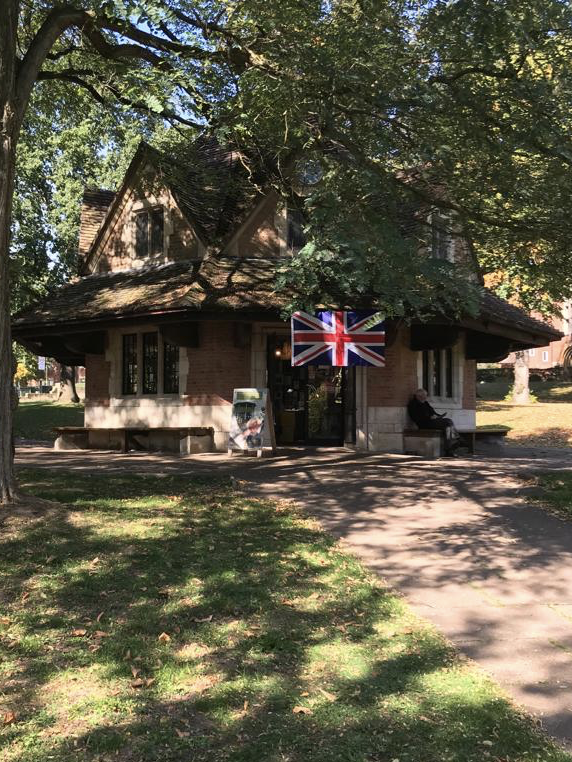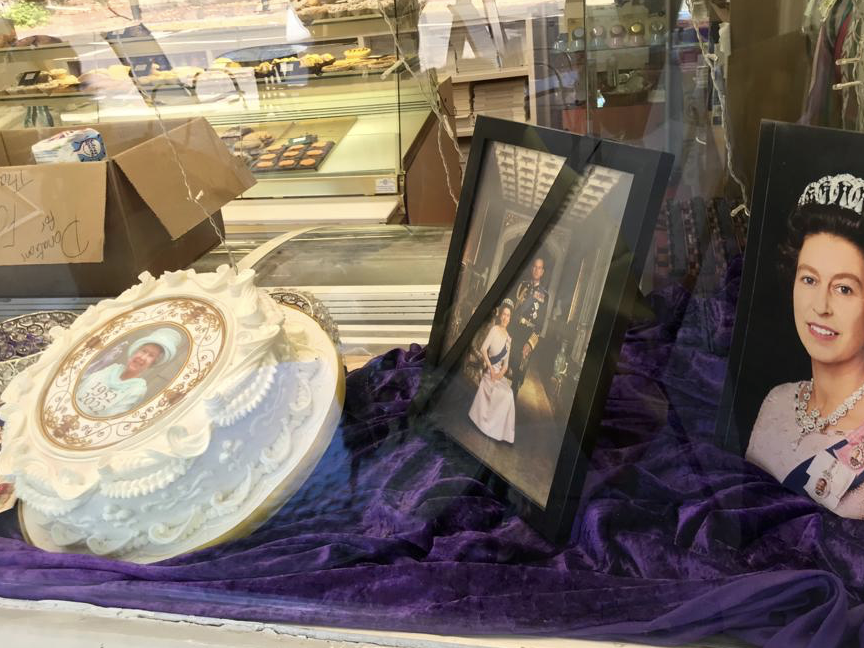
Please Follow us on Gab, Minds, Telegram, Rumble, Gab TV, GETTR, Truth Social
Why yet another article about the British monarchy?
Bear with me – I am taking a different direction with this one, promise.
From a conservative, Western traditionalist perspective, there is A LOT to unpack here.
It is the tale of a country we once were. A country we could be again.
Let us start with the initial reactions to the death of Her Majesty the Queen. Suddenly, every mainstream medium re-discovered some sort of tact, gravitas, and understated simple beauty that appeared to have been forgotten by the end of the '60s. Even the landing page of the British Google had changed its colors to some classy and simple grey:

Our local, large chain grocery store had put a small table at the entrance, some flowers, and a simple, powerful homage to Her Majesty the Queen. A small symbol of beauty and reverence in front of utilitarian shop real estate:

Also, please see the pictures of our small-town bakery and butcher store, which tell us of the aesthetics and patriotism of a Britain that once was:





In the meantime, even before it was known that the Queen had passed away, people in the thousands started gathering outside of Buckingham Palace.
When the Union Jack on top of Buckingham palace was lowered to half-mast, confirming what all had feared, the crowd first stood in silence. And then, defiantly, started singing "God Save the Queen."
London's famed "Black Cab" drivers lined up in a silent procession outside the Mall at night -- simple but very touching.
Clearly, something extraordinary is happening here, that we as conservatives should take a close look at.
An otherwise atomized society came together, and the national anthem was used in the same soothing way that church hymns used to be embraced in bygone more religious days. Opposition and government put petty squabbles aside and united in praise of this extraordinary woman.
Walking around the city of Birmingham, listening to and watching the news coverage, a sense of grief was almost palpable. Grief not just for the loss of the much-loved monarch but for something that went well beyond the Queen herself: the inkling of something great that is gone but that still can be, and might always be there.
Any Jungian psychologist would have had a field day; pre-verbal faculties of the human mind that allow us to appreciate dimensions so much deeper than we could ever articulate.
On the sense of loss - the appreciation of a past that has almost slipped away, with the last representatives of the World War II generation almost all having passed away. With Queen Elizabeth II, a direct cord to the past has been cut. A past that stretches way further than herself. A past that linked her to 15 prime ministers. A past that involved meeting all U.S. presidents since Eisenhower. A past that involved weekly meetings with Winston Churchill. Quickly pause and think about the past that Churchill was connected to, leading to his youth in Victorian Britain and beyond. A Britain that was self-assured, knew its deep roots, studied its myths, celebrated its poets, and in many ways invented modernity as we know it.
We were given a glance of that past that effortlessly used symbols and powerful narratives last year at Prince Philip's funeral. Take the "Jerusalem" hymn with its invocation of the ancient, the aspirational, and the bravery of an old warrior that has laid down his weapons:
“And did those feet in ancient time Walk upon England's mountains green?
[…]
Bring me my bow of burning gold:
Bring me my arrows of desire:
Bring me my spear: O clouds unfold!
Bring me my chariot of fire.
I will not cease from mental fight,
Nor shall my sword sleep in my hand
Till we have built Jerusalem
In England's green and pleasant land.”
There was a further powerful ritual at that funeral that could tell any conservative so much about monarchy and what makes Christian societies (even in their secularized form) so special. Bishop Welby read out for the last time all of Prince Philip's many earthly titles and then commended him as a simple servant of God by the name Philip, underscoring that central Christian creed that in front of God, beggar and King are of equal value. This was all concluded by a lone bag-piper, Pipe Major Colour Sergeant Peter Grant, who brilliantly played the tune of "Flowers of the Forest" as he walked down a dark corridor from the chapel into the light - the age-old struggle of light and darkness (see John 1:5) symbolized so succinctly.
Contrast this deep understanding of the human condition, the sense of deep roots, and this feeling of connectedness as a people to modern society:
Prior to Prince Philip's funeral, the BBC (British Broadcasting Cooperation) quietly tried to make the song "Rule Britannia" disappear from the famed "Last Night of the Proms," as it was too "jingoistic." These days this Britain-hating media outlet with British in its very acronym lets it be known to us yokels that "jingoism" is only acceptable if you clap for the National Health Service (NHS) or cheer on the Ukrainian nationalism.
The symbols of modern evil even bled into the beautiful ceremony of Prince Philip's funeral. The picture of the grieving Queen sitting all alone at her husband's funeral was heartbreaking. The final camera shot even worse -- a frail, elderly woman sunken into herself, head bowed, sheltering under an enormous hat, no one nearby to provide the comfort of physical proximity. Again, the power of pre-verbal symbolism of a disconnected, inhumane technocracy that thought itself beyond common-sense and human limitations.
These days some of the Queen's funeral processions and the King's proclamation celebrations, especially in Scotland, have been heckled by clever people shouting something to the tune of 'who elected him?'.
I wish the same people had shouted the same question at all the unelected officials that plunged Britain into a series of inhumane lockdowns. Or at the "Behavioural Insights Team," the infamous "Nudge Unit" that provided us with a steady stream of "look into their eyes" scare propaganda of dying crisis actors during the Covid Crisis:

Or at our overlords from the BBC - who although unelected, get to extract the "Licence Fee" from you regardless of whether you consume their increasingly propagandistic programs or not. Compared to what these unelected technocrats have inflicted on us (let's not even go to what unelected technocrats end up doing in systems such as fascism and communism), the monarchy stacks up favourably.
In terms of sharing the hardship of military service, the monarchy comes out on top as well – whilst you would have been hard pressed to find many upper echelon politicians' sons and daughters fighting America's wars since 2001, (the now disgraced) Prince Andrew flew dangerous 'missile decoy' missions during the Falklands War and Prince Harry (as emasculated as he may appear now) served in Afghanistan both as a forward air controller and as an Apache pilot.
Yes, monarchy is always the roll of the genetic dice, as the late Queen's dim-witted grandson Prince Harry illustrates. Yes, it is expensive, but apparently no more expensive than elected presidential offices (such as Germany's largely ceremonial president). What the country gets in return are true keepers of the flame, if they do their job well. The flame is tradition and symbolism so powerful that they remind us of our roots and the values that made us and united us in times of crisis.
The Queen, that humble woman of steely resolve, lived a stoic, uncomplaining sense of duty that is sadly something of a bygone era. She, arguably the biggest celebrity on the planet (judging by how well-known she was), contrasted so powerful with the trappings of a modern celebrity cult. In 70 years, she never gave one personal interview, never indulged us with what she really thought about whom, what she thought of global warming, or who was really mean to her as a child. She, at 96, did appoint her 15th prime minister only two days before she passed away. Actions speak louder than words.
Alas, her immediate successor, King Charles III, and his successor, Prince William, are not a chip off the old block. For years Charles III has been droning on about global warming (instead of sticking to the deeply traditionalist conservationism of his father). Prince William, meanwhile, has been pontificating about his own mental health, the "toxic masculinity" of male emotional self-restraint and competitiveness (hey, both traits only built civilisation, that should count for something).
I fear that these two well-meaning but foolish scions of the Queen have already bowed to modern Zeitgeists, which defeats the purpose of having a monarchy.
Finally, let us look at what the monarchy seems to mean to the people and which segment of the people. I cannot help but notice on TV that a disproportionate number of the mourners being interviewed on TV are from the North of England and disproportionately of working-class and lower-middle-class backgrounds. The North of England is probably the most neglected part of the structural changes hitting this island from the late 1960's onwards. Its industries of steel, textiles, coal, and other industries fell away and, the city of Manchester set aside, were not really replaced with much else to compensate for those losses.
Furthermore, whilst the Scots and the Welsh were allowed their own cute nationalism, being English and nationalistic was equated with being bigoted. Still, these beautiful Northerners remained the most patriotic bunch (both proud of Britain and proud of England) you will find anywhere in the UK. An interview last weekend showed two Northern women who slept outside St. Giles Cathedral in Edinburgh in order not to miss the chance of saying farewell to their monarch. I experienced the same on a much larger scale during the Brexit party in January 2020 outside Parliament Square – a disproportionate part of the attendants were Northerners who travelled from faraway places in order to celebrate this historic moment.
What does that tell us? There clearly is something in it for these loyal and hardy people that monarchy and old-school symbolism and patriotism gives to them – something that our modern, nihilist powers that be cannot provide.
The current "elites" only seem to grant the English people nationalist symbols when it is the colors of Ukraine (a place they sneered at before) or other government-approved causes such as rallying behind the UK's underperforming, failing socialized National Health Service (NHS). At the same time, having stood idly by as regulations, socialist policies, and overzealous labor unions destroyed local industries, the same elites started lecturing these areas about their white privilege. (There is not much privilege to go around up North, regardless of the color of your skin.) "Why stop there?", these "elites" must have thought as they started cracking down on the last symbols of patriotism and commenced slandering the proud history of the British Isles as a simple tale of conquest and bigotry. (Never mind the high price in blood and treasure that the Royal Navy paid in eradicating slavery; simply google the history of the West Africa Squadron and you may find something you have not heard about in school.) Unsurprisingly, where these "elites" succeeded, they left behind a demoralized populace, poor self-esteem, and in its wake, widespread crime and substance abuse.
Faced with the choice between these two types of unelected elite culture, I am going to throw in my lot with the monarchy and the forces of traditionalism, everything that always made Britain great.
I hope that the British monarchy will understand what made Queen Elizabeth II and her late husband such great keepers of the flame. I hope that many of the Britons will keep the flame alive of what they have shown over the last week – pride, love for their beautiful country, wonderful symbols and cherish its deep roots that served the rest of the world so well. They may just get to the kind of country Britain still could be.
As conservatives, we should take a good look at all of this and learn from it – whether we support the monarchy or not – and bear Edmund Burke's reflections in mind: When we lay the axe of modernity to something with deep roots, we may not understand why it exists and the value it provides, until it is too late.
Rest in peace, Queen Elizabeth II. God Save the King!
Subscribe to our evening newsletter to stay informed during these challenging times!!
Aging and death is a cruel master.
Thank you, Mr. Geib for such beautifully presented reflections on the deep and profound value of the monarchy to a common spiritual core that can bind and unite a nation. The stark contrast between the culture of traditional values and the ephemeral, nihilistic processes of the intellectual elite is clarifying.
Your closing reference to Edmund Burke's cautionary remark about "the axe of modernity" could not have been more apropos. I would only add in regard to the aforementioned elite, that the word "hubris" appears not to be part of their collective vocabulary.